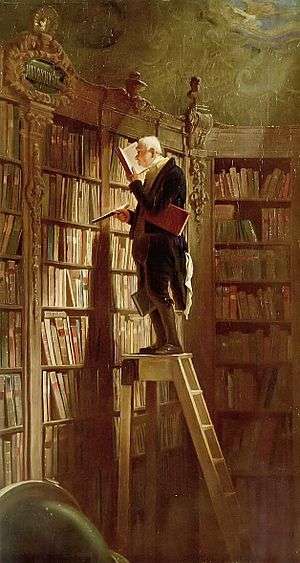Bibliophilia

Bibliophilia or bibliophilism is the love of books, and a bibliophile or bookworm is an individual who loves and frequently reads books, though bookworm is normally used pejoratively.
Profile
The classic bibliophile is one who loves to read, admire and collect books, often amassing a large and specialized collection. Bibliophiles usually possess books they love or that hold special value as well as old editions with unusual bindings, autographed, and/or illustrated copies.[1]
Usage of the term
Bibliophilia is not to be confused with bibliomania, a potential symptom of obsessive–compulsive disorder involving the collecting of books to the extent that interpersonal relations or health may be negatively affected, and in which the mere fact that a physical object is a book is sufficient for it to be collected or beloved. Some use the term "bibliomania" interchangeably with "bibliophily", and in fact, the Library of Congress does not use the term "bibliophily," but rather refers to its readers as either book collectors or bibliomaniacs.[2] The New York Public Library follows the same practice.[3]
History
According to Arthur H. Minters, the "private collecting of books was a fashion indulged in by many Romans, including Cicero and Atticus".[4] The term bibliophile entered the English language in 1824.[5] A bibliophile is to be distinguished from the much older notion of a bookman (which dates back to 1583), who is one who loves books, and especially reading; more generally, a bookman is one who participates in writing, publishing, or selling books.[6]
Lord Spencer and the Marquess of Blandford were noted bibliophiles. "The Roxburghe sale quickly became a foundational myth for the burgeoning secondhand book trade, and remains so to this day"; this sale is memorable due to the competition between "Lord Spencer and the marquis of Blandford [which] drove [the price of a probable first edition of Boccaccio's Decameron up to the astonishing and unprecedented sum of £2,260".[7] J. P. Morgan was also a noted bibliophile. In 1884, he paid $24,750 for a 1459 edition of the Mainz Psalter.[8]
See also
- Book collecting
- Bibliophobia
- Oxford University Society of Bibliophiles, UK
- United States:
- Similar terms
Notes
- ↑ Carter, John (1952). ABC for Book Collectors.
- ↑ Library of Congress
- ↑ New York Public library search
- ↑ Minters, Arthur H. (1979). Collecting Books for Fun and Profit. New York: Arco Publishing Inc. ISBN 0-668-04598-1.
- ↑ Merriam-Webster: bibliophile
- ↑ Merriam-Webster: bookman
- ↑ Connell, Philip (2000). "Book Collecting: Cultural Politics, and the Rise of Literary Heritage in Romantic Britain". Representations. 71: 24–47. doi:10.1525/rep.2000.71.1.01p00764.
- ↑ Basbanes, Nicholas (1995). A Gentle Madness: Bibliophiles, Bibliomanes, and the Eternal Passion for Books. New York: Henry Holt.
References
- Merriam-Webster, Inc. (1996). Merriam-Webster's Collegiate Dictionary (10th ed.). Springfield, Mass: Merriam-Webster, Inc. ISBN 0-87779-709-9.
Further reading
|
|
- Basbanes, Nicholas A. (1995) A Gentle Madness: Bibliophiles, Bibliomanes, and the Eternal Passion for Books, Henry Holt and Company, Inc.
- Bulletin du Bibliophile (in French), ISSN 1770-7099 1834- . Since 1963 published by the Association Internationale de Bibliophilie.
- Richard de Bury (1902). The love of books: The Philobiblon translated by E. C. Thomas. London: Alexander Moring
- Rugg, Julie (2006). A Book Addict's Treasury. London: Frances Lincoln ISBN 0-7112-2685-7
- Thomas Frognall Dibdin (1809). Bibliomania. New York, Henry G. Bohn.
- Andrew Lang (1881). The Library. London, Macmillan & Co.
- Stebbins, Robert A. (2013). "The Committed Reader: Reading for Utility, Pleasure, and Fulfillment in the Twenty-First Century." Lanham, MD: Scarecrow.
External links
| Look up bibliophilia in Wiktionary, the free dictionary. |